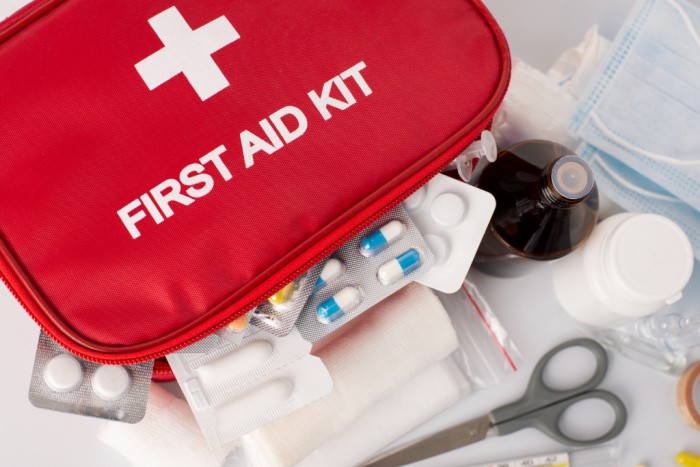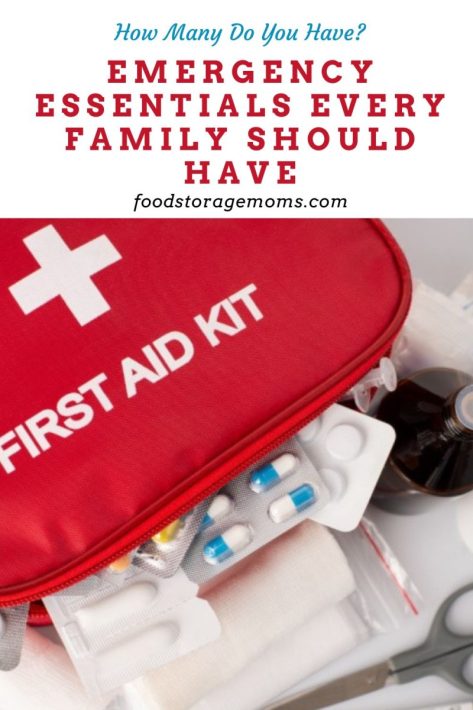
When you’re unprepared for a disaster that strikes unexpectedly, your family’s basic needs and well-being can be in jeopardy. What if all the grocery stores are closed in your area, or your local emergency shelter turns you away because of total capacity? What will you do then?
That’s why it’s so critical that you gather certain supplies, food, and water so that your bad situation doesn’t go from bad to worse. For those of you who have a family, that means thinking about stockpiling larger quantities and having the supplies that a particular family member may require. These are emergency essentials that every family should have.

Emergency Essentials Every Family Should Have
Food
When stocking up on food, consider these: Try to stick with non-perishable food items that have a much longer shelf life so that they aren’t out of date when you need them.
Also, focus on gathering foods that don’t require refrigeration or don’t necessarily need to be cooked before eating. Your emergency food supply should be able to feed everyone in your family for a minimum of 3 days.
It would be best to consider purchasing food items your family likes strongly. You don’t want to have food for a disaster that no one in the family wants to eat. Take a look at these few examples of food that would be wise to stock up on:
- Canned meat, vegetables, and fruit (don’t forget a manual can opener)
- Nuts and dried fruits
- Fruit and protein bars
- Beef sticks and jerky
- Peanut butter
- Crackers
- Comfort foods for children (snack cakes, fruit snacks, chips, etc.)
- Gatorade and Pedialyte
Drinking Water
Water is arguably your number one essential on this list because you’ll only last a few days without it. When a disaster strikes, there’s the possibility that you’ll have contaminated drinking water available, or no water for that matter.
The general rule is that an individual needs an average of one gallon of water daily for drinking and sanitation purposes. Be sure to gather at least a 3-day water supply for each person, so if you have four people in your family, that’s a minimum of 12 gallons of water.
We need four gallons per person daily. I get thirsty just thinking about only one gallon a day. So, for a three-day supply for a family of four, you should have 48 gallons stored away.
If you are feeding your baby formula or you happen to have pets, you’ll also need to take that into account and have extra water on hand. If you have to evacuate your home, a portable water filter can be used to filter the water from almost any source. That way, you’ll have fresh and clean water no matter where you are.
First aid kit
Don’t be caught in a disaster without a first aid kit, especially if you have younger children. Your family may likely get roughed up a bit, so you’ll need to be able to dress and bandage up your wounds. In case you missed one of my first aid kit posts, First Aid Kits by Linda
Your kit should include latex gloves, dressings, adhesive bandages, scissors, tweezers, antibiotic and burn ointments, soap, antibiotic towelettes, an eyewash solution, and a thermometer. You may also want to consider having a splint for broken bones on hand.
Over The Counter Medications (OTC)
When you’re under a lot of emotional and physical stress from the trauma that disasters often cause, there’s a good chance that you could get sick. Be sure to stock up on several over-the-counter medications to help with the symptoms. It would be best if you considered some of the following: aspirin, non-aspirin pain relievers, cold medicine, anti-diarrheal, antacids, and laxatives. In case you missed this post, 35 OTC Medications You Should Store
Hand-crank or battery-powered radio
It could be the difference between life and death if you don’t have a radio to stay updated on weather reports and updates of conditions near your home. Get yourself a hand-crank or battery-powered portable radio so that you can know whether to evacuate or take shelter.
Multiple flashlights with extra batteries
Don’t be left in the dark following a disaster. Consider stocking up on enough flashlights and extra batteries for each member of your family. I love some solar-powered flashlights, and I also have some that crank to recharge the batteries.
Wrench and pliers
If you need to turn off your home’s utilities, remember to have a wrench and some extra pliers. It may not be necessary, but it’s best to be prepared, just in case.
Duct tape
Duct tape is handy for any job, whether it’s helping to hold together a shelter or repairing damaged clothing or broken windows. In case you missed this post, Duct Tape: Why You Need To Store It
Fire Extinguisher
A fire extinguisher can help you put out minor fires in your home so that your home doesn’t wind up being a total loss. In case you missed this post, Fire: How Can I Prevent One In My Home
Additional clothing
Be sure to have additional clothing prepared and set aside, such as long-sleeved shirts and long pants. If the emergency occurs in winter, sweatshirts, jackets, gloves, snowsuits, and boots will all be necessary.
Extra shoes
It’s miserable once your shoes are soaking wet and your feet get cold. This is why you should have an extra pair of shoes for each family member. Extra socks are also important, particularly if you must change your shoes due to moisture.
Blankets
You can never have too many blankets, especially when your family tries to stay warm after the power has gone out. Here are 6 Reasons To Store Blankets For Any Emergency.
Whistle
You may need to be rescued from your home by emergency crews, but you may not have enough strength left for you to be heard if you try to scream or yell out. This is why a whistle is so critical for you to have since the sound carries such a long distance. I have several of these Whistles for Emergencies.
Heat
Depending on where you live, please check out items that would be safe for heating your home. I live in the desert, and I’m going to use blankets—lots of blankets. It’s hard if you live where fireplaces and wood-burning stoves are not allowed. For the first 40 years of my marriage to Mark, we always had a fireplace with a wood-burning stove or insert. Not now, and our HOA will not allow them.
Additional Items Depending On Your Family’s Needs
A vast majority of all the emergency supplies and essentials that every family should stock up on will look fairly similar, but there will certainly be several differences. That’s because every family is unique from one another and has different needs. What works for one family makes entirely little sense for another. These are several other emergency essentials that you should consider stocking up on if they relate to you and your family:
- Prescriptions and medications (rotate periodically)
- Respirator/Nebulizer/Inhalers
- Other Essential medical supplies (blood pressure and glucose monitoring equipment)
- Glasses, Contacts, and Solution
- Personal Hygiene and feminine products
- Diapers, wipes, and baby formula
- Baby food
- Dog or cat food
- Cat litter
- You need additional water for your pets based on their weight: one ounce of water per pound (weight of the pet) each day. So, if your dog weighs ten pounds, you need ten ounces of water each day.
Final Word
When you’re prepping for an entire family, there’s a lot more that you have to consider than when you’re living on your own. These are several emergency essentials that your family should have in case a disaster were to ever happen to you. What other supplies do you think may not be on my list? I’d love to hear your thoughts. May God Bless this world, Linda.
Copyright Images: First Aid Kit AdobeStock_333791400 by Vitalii
The post Emergency Essentials Every Family Should Have appeared first on Food Storage Moms.
from Food Storage Moms
No comments:
Post a Comment